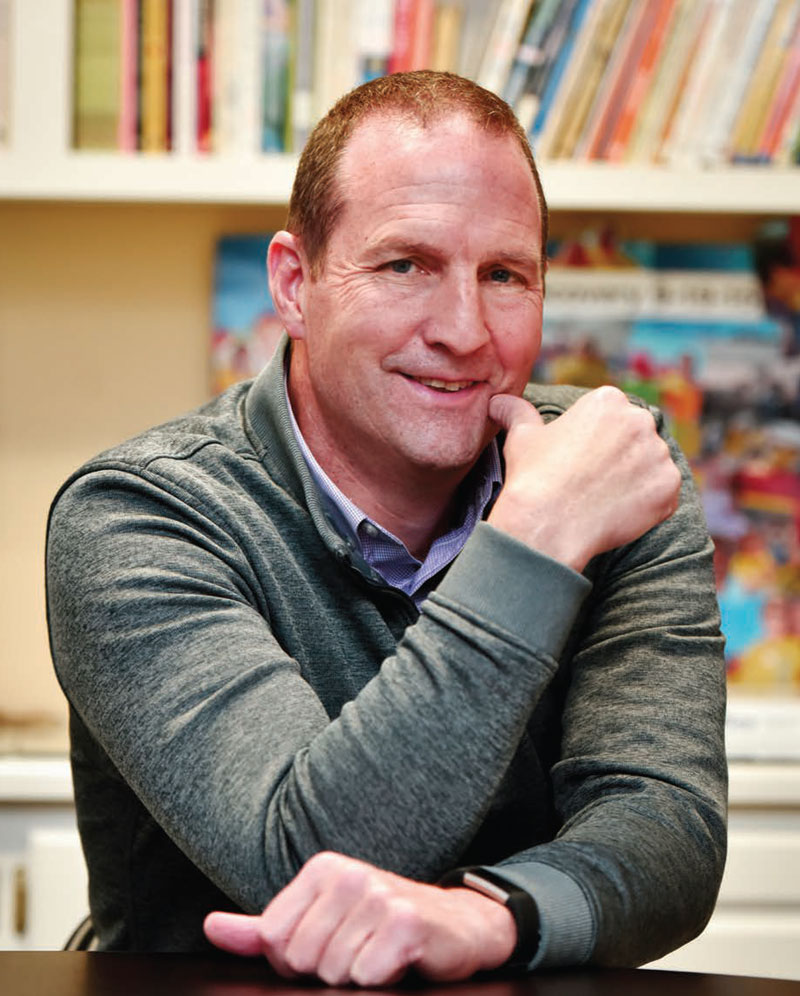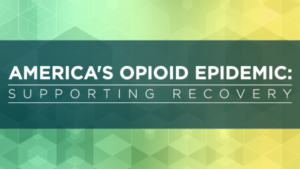In the News
Greenville, SC | February 8, 2022
FAVOR Selects Lesley Pregenzer as New CEO
Upstate woman with years of non-profit leadership experience selected to head up local recovery community center.
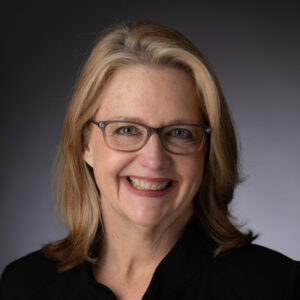 FAVOR, a non-profit corporation that provides compassionate and innovative recovery support services to those suffering from substance use disorder in the Upstate, welcomes Lesley Pregenzer as CEO.
FAVOR, a non-profit corporation that provides compassionate and innovative recovery support services to those suffering from substance use disorder in the Upstate, welcomes Lesley Pregenzer as CEO.
Pregenzer was the Director of Development and Alumni Services at Pavillon in Mill Spring, NC and brings over 25 years’ service as a non-profit professional to FAVOR. She starts February 21.
“I am very excited about joining FAVOR,” Pregenzer says. “I believe FAVOR offers a highly effective model of serving those suffering with substance use disorders, and their families, along many pathways to recovery.”
Pregenzer built a vibrant and engaging alumni department at Pavillon and raised significant resources for the organization. Pregenzer also had a long tenure at World Vision, a humanitarian aid organization helping children overcome poverty.
As a woman in long-term recovery, she has dedicated herself to providing equitable access to all people in need of support. Pregenzer was born and raised in the California Valley. She received a BA from Humboldt State University in Northern California and spent 20 years in Seattle before settling in South Carolina. She resides in northern Greenville County with her husband Bob Morris, their combined 5 adult children and their rescue pup, Bo.
About FAVOR
FAVOR’s mission is to assure that everyone has a fighting chance at recovery in the Upstate of South Carolina. It provides a compassionate and innovative response to the suffering caused by substance use disorders for over 5,000 new individuals in Upstate South Carolina each year: Rebuilding Lives, Healing Families, Strengthening Communities.
GSA Business Report | Staff | July 29, 2020
USC School of Medicine Greenville expands addiction treatment program
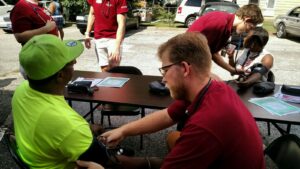
Students in the USC program serve Nicholtown residents.
An idea born in a lunch-and-learn session has led to a substance use disorder treatment curriculum at the University of South Carolina School of Medicine Greenville.
Faces and Voices of Recovery Greenville and the medical school are partnering with the online educational platform Youturn and the Substance Abuse and Mental Health Services Administration to add elective coursework for medical students in Greenville.
After Favor Greenville made a presentation at the medical school several years ago, a student suggested to Dr. Lauren Demosthenes, an associate professor and an obstetrician/gynecologist with Prisma Health-Upstate, that addiction treatment would be a good addition to the curriculum, according to a news release.
Later that year, Demosthenes taught substance use disorder treatment to 10 students and the elective class went so well, she partnered with Favor Greenville to offer hands-on experience with recovery coaching, the news release said. The class became integrated into a four-year curriculum.
This summer’s substance-use disorder and recovery course is led by Demosthenes and Rich Jones, CEO and COO of Favor Greenville and chief strategy officer for Youturn, which Jones co-founded to help people with addiction and those in their support system, according to the release.
“We are extremely proud to be on the cutting edge of education pertaining to substance use disorder and feel it is crucial for our medical students to be knowledgeable and well equipped to care for individuals affected by this struggle,” Demosthenes said in the release. “Regardless of what field our students are going into, this topic translates into each and every specialty in the medical profession.”

Rich Jones leads class of medical students.
Thirty students signed up for the summer course, which has become even more crucial, according to the release, following a 39% increase in opioid overdoses across the state since last year.
“We know that we are losing the battle against substance use disorders and co-occurring mental health issues,” Jones said in the release. “We know that the fragmented, acute care treatment model has serious limitations. Seeing these future physicians embrace recovery principles lifts our spirits because it indicates a pathway out of this addiction crisis. It is clear that these medical students have compassion and empathy for individuals struggling with substance use disorders. I believe that the full integration of SUD treatment and recovery into health care settings is our best shot at improving outcomes and saving lives.”
Jones teaches course modules featuring the perspectives and stories of patients who struggle with addiction. On a day-to-day basis, Jones works to help people move from addiction to recovery through Favor while also managing Youturn.
The Greenville News | Daniel J. Gross | March 29, 2020
Coronavirus ‘will drive up overdoses’
SC grapples with pandemic amid opioid crisis
 Hassan Salaam read quietly from an addiction recovery book inside his small bedroom during a gloomy afternoon in Greenville on Monday. The written testimonies from other men and women fighting addictions help him persevere.
Hassan Salaam read quietly from an addiction recovery book inside his small bedroom during a gloomy afternoon in Greenville on Monday. The written testimonies from other men and women fighting addictions help him persevere.
But before long, he was interrupted by a text message. Then another one. The texts are more common now.
“A lot of people aren’t coming out at all, so this is the only way to connect,” the 51-year-old New Jersey native said after replying to a friend’s text. “People are quarantining themselves, so this helps.”
The reality of the coronavirus pandemic has made those in recovery a vulnerable group disproportionately at risk of exposure to the virus and susceptible to their own relapse, according to treatment providers and experts in South Carolina.
Isolation is highly discouraged if recovering from drug addiction, according to treatment providers.
A typical recovery plan requires regular check-ins with counselors, peer support group meetings and often physical visits to clinics to receive doses of methadone, one of several drugs used to ween someone off an addiction.
“(Coronavirus) will drive up overdoses. It will drive up people going to the street,” said Rich Jones, director of FAVOR Greenville, a nonprofit that offers drug addiction treatment services. “This is where holes in the system get exposed.”
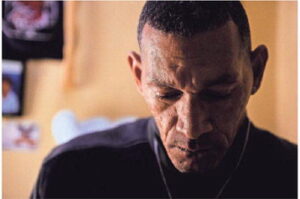 Salaam, 51, has been three years sober after battling a heroin addiction most of his life. He’s been living at Freedom Recovery Center in Greenville for close to a year, after previously living in Charleston where he relapsed.
Salaam, 51, has been three years sober after battling a heroin addiction most of his life. He’s been living at Freedom Recovery Center in Greenville for close to a year, after previously living in Charleston where he relapsed.
A three-quarter empty bottle of Equate hand sanitizer sat near a collection of recovery coins by his bedroom door. The bottle’s not usually there — in fact, it’s been stashed away for years, but Salaam recently began using it again, he said.
What keeps him going is group meetings, lots of groups meetings — places where fellow men and women in recovery check in with each other, hug, laugh and build a sense of community.
“A hug will go a long way in someone’s life. We can’t do that,” Salaam said. “Isolation can take you away from recovery.”
The Greenville News | Daniel J. Gross | September 24, 2019
PART 2: ‘Greenville under siege’: Agencies scramble for help in opioid addiction battle in SC
This is part of a four-part series examining the addiction, deaths, recovery efforts and legal battle underway in a county that’s “under siege,” as a federal judge put it, from an opioid epidemic.
The message from a U.S. district judge in drug court last month was clear: “Greenville is under siege.”
Federal Judge Bruce Hendricks uttered those words during a case in response to new data that shows opioid overdose deaths are spiking at an alarming rate in Greenville County, which saw an 80% increase in the deaths in 2018 compared to the prior year, according to a new report from the state Department of Health and Environmental Control.
Greenville County had more overdose deaths than any other county in the state in 2018. Consider these statistics:
► South Carolina in 2018: 1,103 overall overdose deaths
► Greenville County in 2018: 172 overall overdose deaths
► Greenville County in 2018: 131 opioid-related overdose deaths
► Greenville County in 2017: 73 opioid-related overdose deaths
On Aug. 20, alone — a single day — there were at least four opioid overdoses, said Rich Jones, director of FAVOR Greenville, a long-term addiction recovery organization. None of them were fatal.
The Greenville News | Liv Osby | September 24, 2019
PART 1: Surviving 4 ODs: SC woman’s opioid recovery an exception in Greenville’s 80% death spike
This is part of a four-part series examining the addiction, deaths, recovery efforts and legal battle underway in a county that’s “under siege,” as a federal judge put it, from an opioid epidemic.
A party of 30 arrives for breakfast at the already crowded Tommy’s Country Ham House on a recent Wednesday morning, jolting the kitchen staff into high gear amid the drone of whirring fans and clanking plates.
In jeans, a purple “I Love Tommy’s” T-shirt and a tan cap over her cinched-up auburn hair, Brooke Long ladles grits, scrambled eggs and sausage onto large white platters.
It’s a demanding job Long executes with an athletic efficiency, both because she enjoys it and because it’s an important part of her new life in recovery.
She’s a survivor, four times over.
If only others had been so lucky.
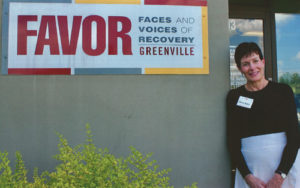 Life Inside the Park | by Kim Von Keller | September 2019
Life Inside the Park | by Kim Von Keller | September 2019
Life in Recovery Can Be Sparkling
Gene Aiken of Bella Grove is happy to share the details of what she calls her “Big Life Bonus.” Her marriage to Johnny Aiken in 2017 didn’t just create a new couple, but a blended family of 27. Her shimmery fairy hair has become her trademark. She has a huge sweet tooth, and she enjoys hosting small dinner parties. She celebrated her granddaughter’s high school graduation by skydiving! She has also been in recovery from alcoholism for 30 years.
If it shocks you that she shares this, that’s the reason she shares this. According to statistics, over 40,000 individuals in Greenville County have a diagnosable substance use disorder, but fewer than ten percent receive any type of help at a given time. One of the greatest obstacles to recovery is the shame and stigma surrounding the disease, which is why, in 2004, Gene, her friend Jane Pressly, and a small group of community advocates founded Faces and Voices of Recovery (FAVOR) Greenville, an organization dedicated to providing intervention and support services to those seeking recovery. Download the full story.
 4WYFF | Taggart Houck | August 19, 2019
4WYFF | Taggart Houck | August 19, 2019
DHEC: Opioid-related deaths in Greenville County up nearly 80%
Report suggests sharp increase as Upstate recovery center calls for “radical” change
GREENVILLE COUNTY, S.C. — Opioid-related deaths in Greenville County increased 79.5%, according to a report released by the South Carolina Department of Health and Environmental Control. According to the data, there were 73 opioid-related deaths in 2017 in Greenville County. In 2018, 131 people died from opioid-related deaths. Read more
The Newstand | College of Behavorial, Social and Health Sciences | Frances Parrish | February 25, 2019

The research team consists of (from L-R) Prerana Roth, Lauren Demosthenes, Kaileigh Byrne, (front row) Tricia Lawdahl and Katy Dumas. (Image Credit: College of Behavioral, Social and Health Sciences)
UofSC School of Medicine Greenville, Clemson University, Prisma Health-Upstate, and FAVOR Greenville see success through addiction recovery research
Since starting data collection less than a year ago, a team of researchers are already starting to see success in an addiction recovery study using Faces and Voices of Recovery (FAVOR) – Greenville’s addiction recovery program that involves recovery coaches while the individual is still hospitalized from complications of long-term substance use.
The research team consists of Drs. Prerana Roth and Lauren Demosthenes from Prisma Health–Upstate, medical students from the University of South Carolina School of Medicine Greenville, CEO of FAVOR Greenville Rich Jones, Trish Lawdahl from FAVOR Greenville and Kaileigh Byrne, Ph.D., a psychology researcher from Clemson University.
The team’s research entails initiating peer recovery services to patients who are hospitalized due to complications from long-term substance use. On average, the patients in this study have grappled with substances use for almost 20 years and have experienced substantial changes in both the reward- and control-related regions of their brains, which can make recovery especially challenging. The goal of this project is to assess the effectiveness of providing an initial link to recovery during hospitalization and its impact on addiction recovery and quality of life.
The team compares outcomes in a group of individuals who are randomly assigned to a recovery coaching intervention with a control group of individuals who are randomly assigned to receive the current standard of care at Prisma Health Greenville Memorial Hospital, which includes a patient-initiated self-referral for addiction treatment. The team conducts follow-up assessments with these patients at 30-day intervals for six months. Since beginning data collection in May 2018, the team has begun to see individuals in the recovery coaching intervention report better physical health and reduced substance use than the control group, Byrne said.
“These initial findings underscore the remarkable success of recovery coaching on overcoming Substance Use Disorder and promoting better overall health,” Byrne said. “By establishing a successful inpatient link to recovery treatment, this study may lead to the development of an effective method of care that can readily be implemented into a healthcare system.”
The project has also gained national attention as a finalist selected for the American College of Physician’s Innovation Challenge.
This research was born from an idea a medical student, Katy Dumas, had based on an elective course, Recovery Coaching for Addiction, that she took during her third year of medical school. During this course, Dumas learned about FAVOR-Greenville which provides certified peer support specialists as recovery coaches who are trained in using recovery-oriented tools to help peers overcome addiction. She talked with Roth about this program, and then Roth helped put the research team together to begin the study. Byrne is the newest member of the team and has helped implement this research, Demosthenes said.
“Our missing piece was a person with a strong research background, and we were introduced to Kaileigh who provides this critical skill on our team,” Demosthenes said. “With many more research ideas in the pipeline, we know that this relationship will continue beyond this project.”
 106.3 Word | Chris Evans | January 20, 2019
106.3 Word | Chris Evans | January 20, 2019
Focus on the Upstate 134 – FAVOR Greenville – 1/20/19
Listen to the podcast: An interview by Chris Evans with Rich Jones.
FAVOR Greenville CEO Rich Jones talks about the nature of addiction, the obstacles to recovery in legalized marijuana and the opioid crisis, and how FAVOR Greenville’s approach differs from traditional rehab programs.
Greenville Talk | Kim Hassold | December 30, 2018
15 Minutes with Richard Jones
Rich is currently the CEO/COO of Faces And Voices Of Recovery (FAVOR) Greenville. FAVOR Greenville is an exceptionally innovative and unique program that aggressively attacks the problem of addiction and other behavioral health issues. FAVOR Greenville is focused on fundamentally changing the way that recovery support is provided. Rich has been able to guide FAVOR Greenville from a start-up idea/concept to the premier provider of recovery support services nationwide. FAVOR Greenville has served over 30,000 individuals and over 8,000 families in the past five years. Service delivery includes 20 plus locations in Greenville county and expansion satellites in Anderson and Spartanburg County. In 2017, FAVOR Greenville was named a national model program by the federal government (SAMHSA) and again in 2018 by the federal Department of Justice. Check out his blog at recoverycartel.com and his organization FAVOR Greenville at favorgreenville.org.
TALK Greenville: What is one thing you wish everyone knew about FAVOR?
Richard Jones: The most important thing I wish people knew about FAVOR Greenville is that we work with all issues related to substance misuse. Not just “addicted people.” We have worked with over 30,000 people over the past five years and almost half of those folks have been family members, friends and loved ones of the person misusing substances
Read the full article at greenvilletalk-sc.newsmemory.com/ (pages 30-31)
The Greenville News | Liv Osby | December 30, 2018
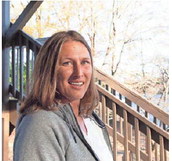
Jennifer Seymour said last year, when she was struggling with heroin addiction, seems like a bad dream. (Photo: SABRINA SCHAEFFER/STAFF)
Out with the old
Last December, Jennifer Seymour was plotting what she could steal to feed her $200-a-day heroin habit, a habit that nearly killed her.
But in the year since surviving a near-fatal overdose, the Greenville woman has gotten into recovery, found a good job and is even considering becoming a recovery counselor herself.
“When I think about what I was doing and where I came from, I don’t even know how to put it into words … I sort of cringe,” she told The Greenville News .
“I don’t even like to think about it a lot,” she said. “It was just terrible.”
Now, she said, everything looks brighter.
And the difference in Seymour “is like night and day,” said Hubert Yarborough, the counselor who met her in the ER after the overdose and put her on the path to recovery.
“She’s still clean and she’s active in the Narcotics Anonymous community,” he said. “It’s remarkable what this girl is doing.”
 TOWN magazine | November, 2018
TOWN magazine | November, 2018
FAVOR ad in Town Magazine
THINK DIFFERENT. ACT ACCORDINGLY.
FAVOR can be seen in the November issue of TOWN magazine.
With this ad, FAVOR hopes to reach out to those looking to change their lives because of addiction.
Here is a link to the full magazine. See page 150 for our ad.
The Greenville News | Liv Osby | August 27, 2018
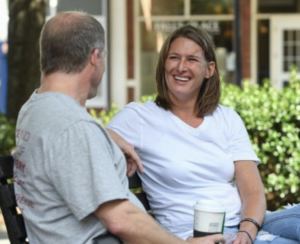
Jennifer Seymour met her recovery coach, Hubert Yarborough, when she woke up in the hospital after a near-fatal overdose. The two often meet to talk as part of Seymour’s recovery process. (Photo: BART BOATWRIGHT/Staff)
From a $200-a-day habit to recovery: Woman finds Greenville FAVOR to beat addiction
The first time Jennifer Seymour saw Hubert Yarborough was in the ER as she was recovering from a near-fatal heroin overdose.
It was a chilly day in January and Seymour had unwittingly injected a bad dose of fentanyl-laced heroin into her arm on the way to work and lost consciousness.
Her terrified friend, who was driving, rushed the 30-year-old to the hospital, where doctors gave her the naloxone that saved her life.
As she lay there coming to grips with the idea that she had almost died, a nurse asked if she’d like to talk to someone from FAVOR. “What’s that?” she thought.
“I was like, whatever,” she recalls.
But soon, a fair-haired stranger was smiling at her.
He got her a Gatorade and a blanket. He told her he was there not as a clinician, but as a friend. To maybe help her get into recovery.
GVL Today | Kendall | June 12, 2018
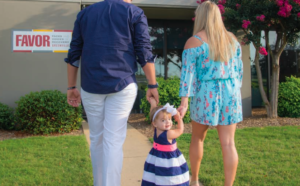 #GoodNews: FAVOR’s unique approach to addiction
#GoodNews: FAVOR’s unique approach to addiction
Let’s start with the numbers: as of February 2018, 17,258 people have been part of Faces and Voices of Recovery’s programming since July 2013. 7,516 family members have participated in its Healing Families Program in that same time. And FAVOR has provided 40,000 hours of recovery coaching.
That’s where their program differs from others that deal with addiction. FAVOR isn’t a rehab or an AA meeting. Their goal is to debunk the “myths” and misconceptions surrounding addiction and recovery and offer a more personalized service.
FAVOR sees themselves as “a recovery-oriented sanctuary” for Greenville. That means there’s no pressure when you walk in to commit to any programs or meet a certain criteria – you could just have a conversation about whether you might be struggling with addiction, or how to approach a family member who is.
Recovery coaches are with you through whatever path you decide to take, offering advice + helping you find the resources you need. You might have no idea how to find a rehab facility, or family members might need guidance in how to help. FAVOR is designed to be your support system, answering every question and pointing you in the right direction.
Want to get involved? You can volunteer with FAVOR (or train to become a recovery coach) or donate (they’re a 501(c)(3) nonprofit + need funding to hire 10 additional recovery coaches to serve 600 more people).
 And their Operation Rescue hotline is available 24 hours a day for anyone, individuals or family members, who needs guidance or has questions.
And their Operation Rescue hotline is available 24 hours a day for anyone, individuals or family members, who needs guidance or has questions.
You can also learn more about FAVOR at Executive Director Rich Jones’s talk “Art of Recovery: What Is the Solution?” on June 20, at their center (355 Woodruff Rd).
Or hear straight from Jones himself (he’s known for his “car rants” speaking plainly + frankly about the truths of addiction):
The New York Times | Laura Hilgers | May 19, 2018
 Treat Addiction Like Cancer
Treat Addiction Like Cancer
Two years ago, I spent a week in Houston helping my stepbrother while he underwent treatment for Stage 4 lymphoma at the University of Texas MD Anderson Cancer Center. I sat with him while a nurse cleaned his chemo port and made records of her work, to keep his medical team updated. I accompanied him for the blood tests that determined his readiness for the next treatment. I stayed by his bed as his stem cells were harvested for a transplant, one of the cutting-edge, evidence-based therapies that ultimately saved his life.
Around the same time, I was helping my 22-year-old daughter, who struggled with alcohol and drug addiction. The contrast between the two experiences was stark. While my stepbrother received a doctor’s diagnosis, underwent a clearly defined treatment protocol and had his expenses covered by insurance, there was no road map for my daughter. She had gone undiagnosed for several years, despite my reaching out to her health care providers, who either minimized my concerns or weren’t sure what to do.
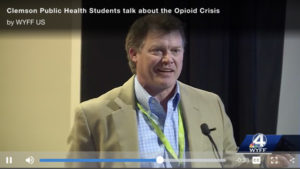 WYFF4.com | Jon Lyon | April 10, 2018
WYFF4.com | Jon Lyon | April 10, 2018
Clemson public health students talk about the opioid crisis
Clemson public health students tackled the opioid crisis with research on “Problems & Solutions, Abuse & Addiction” Tuesday night on campus.
About 75 people listened to the presentation on prevention and recovery. Last December a Clemson student died of an opioid overdose according to the Pickens County Coroner.
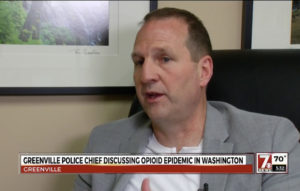 Channel 7 wspa.com | Staff | April 11, 2018
Channel 7 wspa.com | Staff | April 11, 2018
Greenville PD’s Chief Miller participates in Senate subcommittee hearing
Greenville Police Chief Ken Miller served as a witness in a hearing Wednesday afternoon in Washington, D.C. centered on fentanyl and the opioid crisis.
The Greenville Police Department said U.S. Sen. Lindsey Graham, chairman of the Subcommittee on Crime and Terrorism of the Senate Judiciary Committee, invited Miller to the “Defeating Fentanyl: Addressing the Deadliest Drugs Fueling the Opioid Crisis” hearing.
Kevin Bishop, a spokesperson from Sen. Graham’s Greenville office says Chief Miller was “recommended by the SC Sheriff’s Association and Police Chief’s Association for being thoughtful, well spoken and well versed on the issue of fentanyl.”
Miller discussed law enforcement’s role in responding to the ongoing national crisis and answered questions.
He is also offered “insights to include leveraging multi-agency, multi-jurisdictional partnerships for future prevention, intervention, and enforcement services in order to stem the supply and demand for these lethal drugs.”
The hearing was at 2:30 p.m. in the Dirksen Senate Office Building in Washington, D.C.
 Greenville News | Ron Barnett | February 4, 2018
Greenville News | Ron Barnett | February 4, 2018
FAVOR shows new way out of addiction
When a family member is spiraling into the nightmare of addiction, the last thing you want to do when you get them to seek help is sit down and fill out a bunch of forms. But that’s usually the first thing you have to do — even in the emergency room.
Then, maybe 45 minutes later, your loved one gets to meet with a counselor who is filling in a lot of blanks on an assessment form. Eventually the therapist starts trying to get your loved one to open up about his or her painful state, in the sterile environment of an office. It doesn’t have to be ! that way.
A nonprofit organization in Greenville called FAVOR (Faces & Voices of Recovery) is turning that model upside down.
With FAVOR, you don’t have to go through any upfront approval. There’s no insurance involved, no red tape — and you don’t have to pay anything.
Let me repeat that: It’s free.
How do they do this?
FAVOR’s concept is considered “recovery support” rather than traditional therapy, so therapists aren’t bound by the same restrictions. And since insurance companies aren’t involved, they can meet people where they are.
“We can deliver our services anywhere, any time of the day, any different venue,” said Rich Jones, chief executive officer/chi! ef operating officer for FAVOR.
For example, a counselor could go over to a person’s home and talk about drugs with a teenager while playing a video game with him.
“We meet with people in the emergency room, we meet with people in their homes, we meet with people in schools. Kind of anywhere and everywhere,” he said.
That doesn’t mean the recovery coaches aren’t as professional as traditional therapists.
“They’re professionals and they’re professionally trained, and it’s very, very strategic and intentional, but it’s delivered in a more natural way,” Jones said. “And what we believe that does is it leads to that connection that people so desperately need when they’re trying to figure out how to do this r! ecovery thing.”
Don’t get me wrong. I’m not disparaging traditional therapy, or 12-step programs. But this seems to me like something that really has a great chance to change lives. Apparently, the federal government thinks so, too.
FAVOR Greenville has been named one of four model programs by the Substance Abuse and Mental Health Services Administration, a division of the U.S. Department of Health and Human Services. People from across the country will be coming to Greenville to learn how to do what FAVOR does here.
The Greenville group also was chosen to present its model last month at a program with the Surgeon General in Washington, called “America’s Opioid Epidemic: Supporting Recovery.”
Let me stop here and back up a minute, because I know this is sounding way too much like a press release for FAVOR. I don’t do press releases. I write about things I believe in.
And even with just a brief intro to
this program, I’m convinced that it is something special. Something that can save lives. (A big thank you to De Ila Meyer, who introduced me to FAVOR after reading my recent column on meth.) Because it is really about people. I sat through an orientation session last week at FAVOR’s headquarters on Woodruff Road and was deeply touched by the personal stories I heard from the people who run this place.
Most of them had suffered through addiction themselves and grew up in families that were afflicted with the disease. Several of them had lost family members to drugs.
The big thing that makes all this work is the fact that all the money that pays for it comes from donations, from individuals and foundations.
There’s a lot more I could say about this, but if you want to learn more, go to favorgreenville.org or call 864385-7757.
The U.S. Surgeon General on the Role of Peer Recovery Support

Jerome Adams, M.D., Surgeon General of the United States
“You’re in recovery for life; and we can, if we wrap people with the appropriate support services, have a higher success rate for life. We’re actually getting a return on investment by wrapping people with the recovery support services they need to be successful in recovery.”
—Jerome Adams, M.D., Surgeon General of the United States
On February 14, 2018, Faces & Voices of Recovery sponsored America’s Opioid Epidemic: Supporting Recovery at the Newseum in Washington, D.C. We worked with The Hill and Indivior, our co-sponsor, to organize the event and engage high profile speakers including the Surgeon General of the United States, Jerome Adams, M.D.; Senator Sheldon Whitehouse (D-RI), and Congressman Dave Joyce (R-OH).
Our goal was to educate the public and policymakers about recovery from addiction and the role of recovery support services.
With 192 people in attendance, and hundreds more watching online, the event was a huge success!

Sen. Sheldon Whitehouse (D-RI), Member, Senate Committee on Finance

Rep. Dave Joyce (R-OH), Vice Chair, Congressional Addiction, Treatment and Recovery Caucus
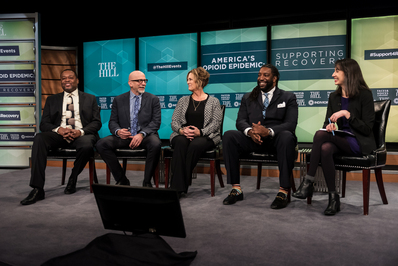
Arthur Evans, Tom Hill, Denise Holden, Andre Johnson and Rachel Roubein
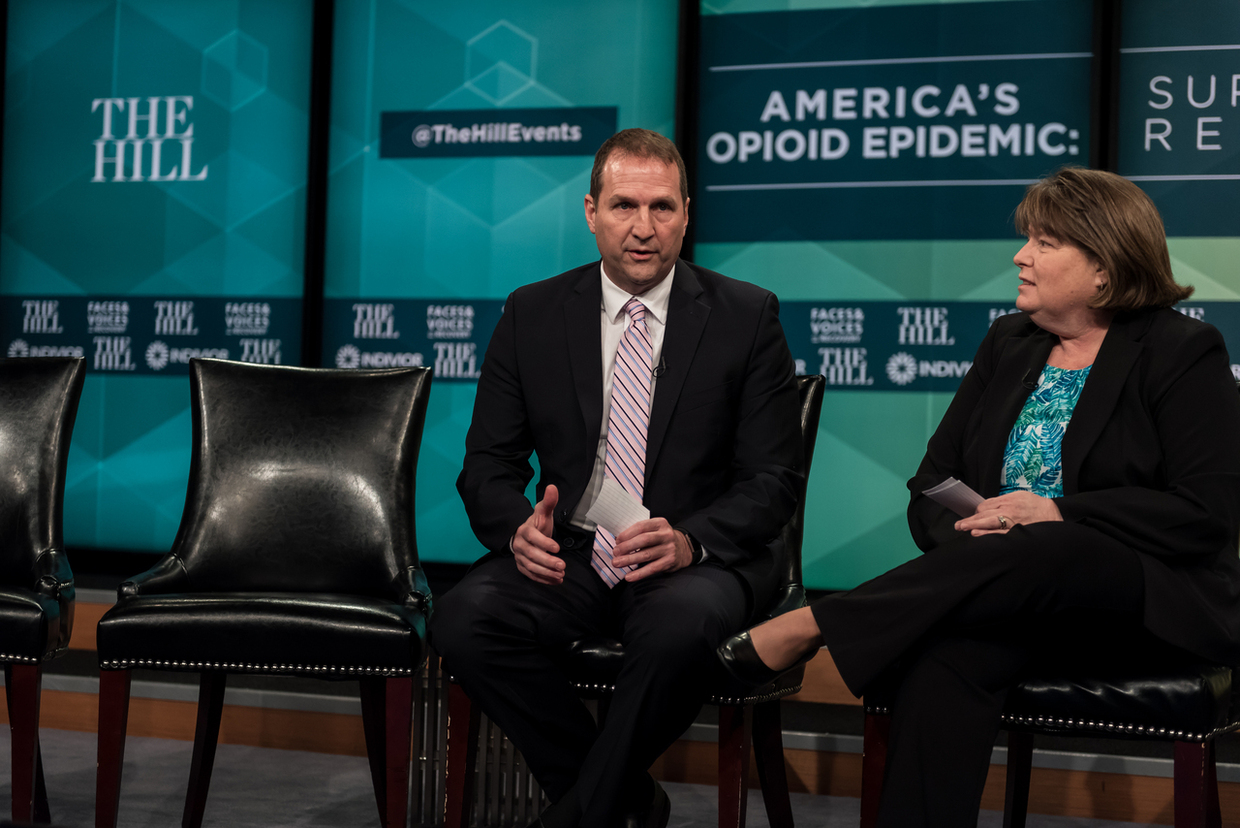
Richard Jones, Executive Director of FAVOR Greenville (SC) and Patty McCarthy Metcalf, Executive Director of Faces & Voices of Recovery
America’s Opioid Epidemic: Supporting Recovery
The opioid epidemic is affecting millions of Americans across the country. Yet few of those with an opioid addiction are receiving treatment for their condition and fewer still have access to services that can support a long-term recovery.
Now that the opioid crisis has been designated a public health emergency, what is being done at the federal and state levels to overcome barriers and deploy effective recovery support programs? The President’s opioid task force has recommended expanding the use of recovery coaches and reinforced the value of services like peer-to-peer programs, skills training, and supportive housing. What role can Congress play in implementing these recommendations and how can they be adequately funded?
On February 14, The Hill convened key government leaders, policymakers, addiction experts and recovery advocates for a solutions-focused conversation on opioid recovery support services.
Speakers
- Jerome Adams, Surgeon General of the United States
- Arthur Evans, Chief Executive Officer and Executive Vice President, American Psychological Association
- Tom Hill, Vice President, Practice Improvement, National Council for Behavioral Health
- Denise Holden, Founder and Chief Executive Officer, RASE Project
- Andre Johnson, President and Chief Executive Officer, Detroit Recovery Project
- Rich Jones, Executive Director, Faces & Voices of Recovery (FAVOR) Greenville
- Congressman Dave Joyce (R-OH), Vice Chair, Congressional Addiction, Treatment and Recovery Caucus
- Patty McCarthy Metcalf, Executive Director, Faces & Voices of Recovery
- Senator Sheldon Whitehouse (D-RI), Member, Senate Committee on Finance
- Bob Cusack, Editor-in-Chief, The Hill
- Rachel Roubein, Health Care Reporter, The Hill
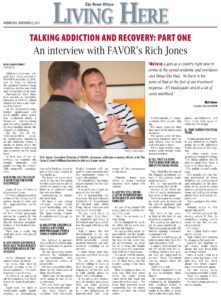 TALKING ADDICTION AND RECOVERY: PART 1
TALKING ADDICTION AND RECOVERY: PART 1
An interview with FAVOR’s Rich Jones
The Greer Citizen
November 22,2017
Addiction/recovery expert Rich Jones arrived at FAVOR-Greenville in 2013, just in time to witness the greatest flood of drug overdose deaths our state and nation have ever seen. Throughout that time, he’s served as Executive Director of FAVOR, which stands for Faces and Voices of Recovery. Read the full article.
TALKING ADDICTION AND RECOVERY: PART 2
An interview with FAVOR’s Rich Jones
The Greer Citizen
November 29,2017
Q: Do you think the Stigma of addiction has been reduced at all over the last decade?
JONES: I think there is more awareness and efforts to address the stigma than I’ve ever seen. I can’t believe all the TV shows that have been done about this issue…even the president talking about it. It’s absolutely amazing the discussion is as open as it is now, so that’s really good. Read the full article.
FACES & VOICES of RECOVERY Announces New Building Strength through Mentorship: Recovery Community Organization Pilot Program
Faces & Voices of Recovery has launched a new pilot program to build the capacity of new and emerging recovery community organizations (RCO’s) through mentorship from well-established, best practice RCO’s that have been nationally accredited through the Council on Accreditation of Peer Recovery Support Services (CAPRSS).
 Four organizations recognized for delivering high-quality peer recovery support services will each work with pilot sites that have demonstrated their readiness to establish an RCO. The Mentor RCOs will provide training, consultation, support and encouragement to help the new groups establish best practices in the delivery of peer recovery support services while building their organizational capacity and strengthening their partnerships with local and state stakeholders.
Four organizations recognized for delivering high-quality peer recovery support services will each work with pilot sites that have demonstrated their readiness to establish an RCO. The Mentor RCOs will provide training, consultation, support and encouragement to help the new groups establish best practices in the delivery of peer recovery support services while building their organizational capacity and strengthening their partnerships with local and state stakeholders.
The exemplary Mentor RCOs include Minnesota Recovery Connection in Minneapolis, Minnesota; Hope for New Hampshire- Recovery in Manchester, New Hampshire, Pennsylvania Recovery Organization- Achieving Community Together (PRO-ACT) in Philadelphia, Pennsylvania; and Faces & Voices of Recovery (FAVOR) Greenville in Greenville, South Carolina. Rich Jones, Director of FAVOR Greenville, stated “We are very proud of this accomplishment. This is a reflection of the FAVOR [Greenville] board, volunteers, and staff and their never ending dedication to this cause.”
RCO’s are independent, non-profit organization led and governed by representatives of local communities of recovery. These organizations offer recovery advocacy activities, carry out community education and outreach programs, and/or provide peer-based recovery support services. The new organizations and communities participating in the pilot program are: Minnesota Alternatives in Spring Lake Park, Minnesota; Recovery Force of Atlantic County, in Brigantine, New Jersey; the community of Dayton, Ohio; and Orange County, California.
“This is what it is all about- meeting communities where they’re at and proving the level of expertise only the Association of Recovery Community Organizations (ARCO) can provide. Our grassroots mentoring approach builds long-term, sustainable recovery capital, influences culture and save lives,” said Jesse Heffernan, National Outreach & Empowerment Coordinator at Faces & Voices.
State of Addiction Special on America’s opioid crisis
GREENVILLE, S.C. — To help focus attention on America’s growing opioid crisis, WYFF 4 and its parent Hearst Television televised a live primetime one-hour special across its stations. The special, “Matter of Fact: State of Addiction,” is part of a year-long multi-platform news and investigative series, supplemented with community-based efforts to inform local audiences of the opioid crisis and efforts to develop solutions. Watch the special 4-part series below.
Addiction struggles shared in obituaries by grieving parents
The Greenville News
June 1, 2017 | page A3
Anna Lee (zlee@greenvillenews.com)
Reghan Berry and Wilkins Lipscomb died two days apart. Berry, 22, of Greer, overdosed first. A family friend found her dead of an apparent heroin overdose on May 16 — a week before she was supposed to enter a 30day rehab program. Lipscomb, 26, of Greenville, died May 18. Their obituaries, published side by side in The Greenville News the following Sunday, were startlingly frank about their struggle with addiction.
Lipscomb graduated from Greenville High School and attended Clemson University before he worked in the insurance business with his father and grandfather, his obituary said. “Wilkins was an avid chef and outdoorsman who enjoyed fishing, gardening, and camping. Although Wilkins was a strong man, his battle skills were no match for the disease of addiction,” his obituary said. Efforts to reach the Lipscombs for comment on this story were not successful.
Berry’s obituary said she attended Riverside Middle and High schools and “never judged a person in her life.”
More
Berry’s mother, Jennifer Woodard, said her daughter had been sober a little over two weeks before she died. She had enrolled into an intensive inpatient program at Morris Village in Columbia in what would have been her fourth trip to rehab.
“I wanted everybody to know that she did have this addiction, this problem, and that she was really fighting it,” Woodard said. “I didn’t want her to be remembered as a junkie. I wanted her to be remembered to be the Reghan I loved.” She shared her daughter’s story with brutal honesty in the hopes it’ll warn other parents about the dangers of heroin. “It’s worse than anybody knows,” Woodard said.
Heroin accounted for nearly 13,000 of the 52,404 drug overdose deaths in the U.S. in 2015, according to a recent Centers for Disease Control and Prevention report. Since 2010, heroin-related overdose deaths have more than quadrupled, according to the CDC, with numbers still rising.
As of March 15, the Greenville County Coroner’s Office has reported eight heroin-related overdoses this year compared to 20 heroin-related overdoses for all of 2016, according to Deputy Coroner Jeff Fowler. In a series of stories detailing heroin’s toil on the Upstate that year, The News found that roughly half of the county’s 95 drug overdoses in 2015 involved either heroin or fentanyl, a synthetic opioid 30 to 50 ti! mes more powerful than morphine.
Addiction for Woodard’s daughter started with painkillers in high school. Then a classmate showed her how to inject heroin, Woodard said. “That was all it took, that one time.”
Heroin changed her daughter chemically and physically. She needed heroin to feel normal. She stole from her family and friends, became homeless. She traded anything she could for drugs, including her body. One day, Woodard said she sat down and spent three hours looking through her daughter’s phone. “It was like going through a stranger’s phone. I found out so much that it made me sick,” Woodard said.
Her story — and her daughter’s obituary — have gone viral since it first appeared in The News on May 21. More than 290 people have posted comments in the guestbook, many of them thanking Woodard for shedding light on addiction and its far-reaching grasp Richard Jones, executive director of FAVOR Greenville, said it’s now incumbent on organizations like his to step up and respond to the heroin epidemic.
Jones hopes to soon launch a new program at FAVOR called Operation Rescue, which will provide 24-hour, on-call assistance for people struggling with addiction.
For more information about the addiction recovery community, call FAVOR at 864-385-7757 or visit favorgreenville.org. The nonprofit provides intervention and counseling services to those seeking recovery. For more information about treatment and referrals, call the Phoenix Center at 864-467-3790 or visit phoenixcenter.org. The Phoenix Center is the legislated substance abuse authority for Greenville County and offers a full range of services to treat substance abuse, including a detox center and outpatient programs.
 Family opens up about addiction in Upstate woman’s obituary.
Family opens up about addiction in Upstate woman’s obituary.
May 22, 2017
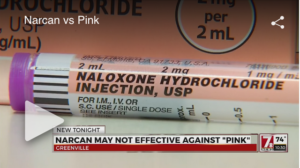 Synthetic drug potentially too powerful for overdose reversal
Synthetic drug potentially too powerful for overdose reversal
May 11, 2017
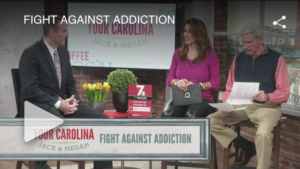 Rich Jones on Your Carolina
Rich Jones on Your Carolina
March 3, 2017
Every day in our communities more than 40,000 people wake up to face another day that is controlled by their drinking or drug use. They or their families ask: “Where do I turn for help? How do I take the first step? What is the solution?” FAVOR Greenville Center is our community’s “Welcome Center to Recovery.” We have Richard Jones here with us this morning to tell us about it.
Week N’ Pulse: FAVOR Greenville Doing Great Work In The Upstate
Saturday, Mar 4, 2017
Deb Sofield joins Rich Jones, the Executive Director of FAVOR Greenville, to discuss some of the great things they’re doing in our community. With the goal of promoting long-term recovery from substance use disorders, Rich talks about some resources and programs available.
Listen to the interview. [sc_embed_player fileurl=”https://www.945theanswer.com/wp-content/uploads/2017/03/Segment-4_FINAL_3-4-2017_mixdown.mp3?_=1″]
THE GREENVILLE NEWS
April 27, 2017 | page A11
IN BRIEF
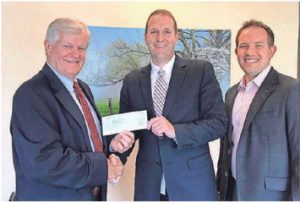
Stewart Spinks, left, presents a check to continue the work of FAVOR Greenville.
FAVOR Greenville receives gift from Shell Oil, thanks to Spinks.
FAVOR Greenville has received a donation from Shell Oil Co. made possible because of the relationship Stewart and Martha Spinks and The Spinx Co. have with Shell. Thanks to their generosity, FAVOR Greenville will be able to continue to provide the life-saving, transformational work that has impacted over 11,000 participants.
Stewart Spinks was employed by Shell after graduating from college. Shell then moved Stewart to Greenville where he later began The Spinx Co. Giving back to the Greenville community has always been a priority to Stewart Spinks and his family.
